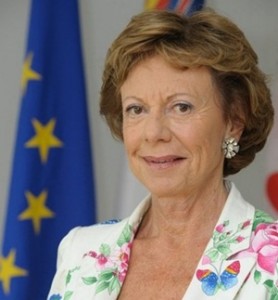EC’s Kroes: ‘European copyright legislation outdated’
September 11, 2012
By Colin Mann
 Neelie Kroes, Vice-President of the European Commission responsible for the Digital Agenda, has warned that Europe’s creative sector faces losing out to the US if steps are not taken to reform copyright in the EU, and suggested that a common European solution was needed to avoid fragmentation and to seize benefits for a European Digital Single Market.
Neelie Kroes, Vice-President of the European Commission responsible for the Digital Agenda, has warned that Europe’s creative sector faces losing out to the US if steps are not taken to reform copyright in the EU, and suggested that a common European solution was needed to avoid fragmentation and to seize benefits for a European Digital Single Market.
Delivering a speech on ‘Copyright and innovation in the Creative Industries’ at the 2012 Intellectual Property and Innovation Summit in Brussels, Kroes declared that in a changing digital age, copyright reform was the right way to support the creative sector, suggesting that the issue should not be considered as an abstract, philosophical issue: but in its context and time.
“Let’s remind ourselves of that context. The world we live in is changing fast. Technology is changing. Business models are changing. The way we consume and enjoy creative works – music, movies, games – is changing. And, if we want to keep the right balance, the legal framework has to respond,” she said.
She note that the last major EU copyright instrument, the Copyright Directive, had been adopted in 2001, based on proposals dating back to 1998.
She noted that among events since then:
- In 1998, Mark Zuckerberg was 14. Today, almost one billion people around the world actively use Facebook, to share photos, videos, and ideas.
- In 1998, YouTube didn’t exist. Today, one hour of video is uploaded every second.
- In 1998, most people listened to music on the radio, CD or tape. Now digital downloads often overtake conventional sales. New technologies allow downloading or streaming; easily, instantly, wherever you are. Not just to passively listen, but to interact and give feedback, to creators and friends.
She suggested that the most important change since 1998 was that back then, creation and distribution were in the hands of the few. “Now they are in the hands of everyone: democratising innovation, empowering people to generate and exchange ideas, supporting and stimulating huge creativity.
She said that copyright shouldn’t be looked at in isolation; “You have to look at how it fits into the real world. So let’s ask ourselves: how well is the current system achieving those objectives, in the world we live in today? Well for one thing, you often find that online licensing restrictions make it impossible to buy music legally. Sometimes, for example, you can’t buy an MP3 across an EU border.”
She queried how this and other such restrictions were improving the EU’s economy. “How are they helping cultural diversity? How are they helping artists live from their art? How are they helping stem piracy? In short, the world has changed, and is changing still. The change is rapid, it is profound, and it is a huge opportunity for the creative sector,” she stated.
“Each day we fail to respond, we are missing out. Consumers miss out on easy, legal access to their favourite products. The creative sector misses out on new markets, new innovations, new opportunities. We all miss out on new ways to share, recognise, and appreciate our cultural heritage. And our economy overall misses out on the chance of new growth,” she warned. “Even today we see the consequences of that loss. The initiatives we can’t seize. The potentially high-flying ideas that get stuck on the runway. The glory and the benefits taken by American companies, not European. And every day that passes we put ourselves in a yet worse position. I’m afraid Europe can’t afford that, not at the moment.”
She noted that change was finally coming for copyright, at many different levels. “Internationally, the World Intellectual Property Organisation is looking into a range of new copyright exceptions and limitations. Nationally, an increasing number of Member States are recognising the need for reforms, and testing new ideas in this field. But we need a common European solution, to avoid fragmentation and to seize benefits for a European Digital Single Market,” she advised.
“Now I am glad the EU is playing its part too, so that our single market, our crown jewel, delivers for the creative sector. We have started a process to asses whether further changes are necessary. For this, Michel Barnier is looking at whether and how the 2001 Copyright Directive needs to be adapted. I fully back his commitment to do that, set out in the Commission’s IPR Strategy of last year,” she confirmed.
“During this process of assessment we should leave passion aside and take a pragmatic view. Is our current system consistent and relevant within the real world? I am open to ideas from all stakeholders: artists, consumers, businesses, researchers. Only together we can adapt ourselves to the future, and stimulate innovation and growth,” she suggested.
“The world is changing fast. Let’s not wait for ever faster technology to be ever more constrained by ever more outdated legislation. Let’s not wait for the USA to speed ahead of Europe. Let’s act right now: for artists, consumers, for our economy,” she concluded.
